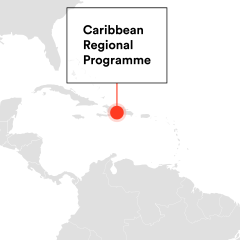Build equitable partnerships with CSOs and WROs

Build equitable partnerships with CSOs and WROs
Case Studies

During the design phase of the Spotlight Initiative Caribbean Regional Programme, it was noted that there was no formal network of CSOs and WROs working to end VAWG. To close this gap, all partners agreed that the region would benefit from establishing an umbrella regional network. To this end, the programme organised a CSO retreat that brought together representatives from ten Caribbean countries.
The inaugural Caribbean CSO retreat was facilitated by UN Women Multi-Country Office (MCO) - Caribbean. Held in Jamaica in August 2022, the week-long retreat provided an opportunity for 24 CSOs and WROs to network, build equitable partnerships, and strategise on how to end violence against women and girls in the Caribbean.
Following the retreat, 30 CSOs were inspired to continue the momentum and came together to form a new regional network of gender NGOs and women’s rights organisations - the Caribbean Gender Alliance. The alliance aims to promote healthy gender relations across the Caribbean region. It has a mandate to implement gender-transformative initiatives with women, men, girls, boys and non-binary persons. This includes supporting the implementation of Health and Family Life Education (HFLE) and similar curricula across the Caribbean, advocating for gender-sensitive policies and practices, and designing sustainable campaigns for behaviour change and healthy gender relations. The Spotlight Regional Programme has continued to support the alliance to strengthen accountability and influence at the regional level.



Grantees of the UN Trust Fund to End Violence Against Women used core institutional funds for a variety of purposes which have contributed to the sustainability of WROs and CSOs, including:
Self-care and staff resilience: In Argentina, Fundación Andhes, an organisation that trains cis, trans and lesbian women to become legal advisors for survivors of violence, used its core funding to hire a psychologist to support staff responding to reports of violence. In Nigeria, the HACEY Health Initiative also engaged a therapist to support their staff. Staff in the HACEY Health Initiative reported that staff were better able to cope with challenges following the introduction of the therapist. Quarterly reports from this intervention document an increase in positive coping mechanisms used by staff and a reduction in anxiety and depression among staff.
Promote institutional sustainability: In South Africa, Gender Links used institutional funding to establish a sustainability-hub and develop a fundraising strategy. Through this, they raised funding to support their next three year workplan. In Papua New Guinea, grantees used institutional funding to develop risk management and contingency plans to strengthen their organisational resilience in crisis. They also invested in the operational and technical capacity of staff through training on referral and case management. They improved their reach within communities through the purchase of transportation. In Haiti, one grantee used institutional funding to provide technology that facilitates remote-working, to support staff continue their work during crises.








